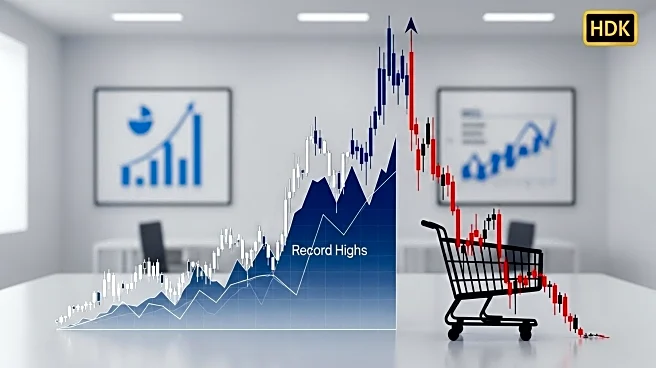What's Happening?
The U.S. stock market has reached new record highs, with the S&P 500 rising by 0.4% in October. However, the consumer discretionary sector, represented by the XLY ETF, has not shared in this success, experiencing a decline of nearly 2% during the same period. Major companies within this sector, such as Home Depot, General Motors, Starbucks, Williams-Sonoma, and Booking Holdings, have seen significant drops in their stock prices. Technical strategist Mark Newton from Fundstrat has noted that while U.S. equities remain bullish, certain sectors are showing signs of weakening, particularly the consumer discretionary sector, which may be entering a correction phase. The recent U.S. government shutdown has delayed key economic data, including the monthly jobs report, adding to the uncertainty. The Bank of America Institute has reported a slowdown in job growth, with payroll growth at its slowest pace in months and rising unemployment insurance claims.
Why It's Important?
The consumer discretionary sector's performance is crucial as consumer spending accounts for approximately two-thirds of U.S. economic activity. The sector's weakness could signal broader market troubles, potentially affecting economic stability. The delayed economic data due to the government shutdown further complicates the situation, making it difficult for investors to gauge the health of the economy. If consumer spending continues to decline, it could lead to reduced economic growth and impact various industries reliant on consumer purchases. Investors and policymakers will need to monitor these trends closely to anticipate potential economic shifts.
What's Next?
The consumer discretionary sector may face further challenges if it fails to rally in the coming weeks, potentially leading to a downgrade from 'Overweight' to 'Neutral' by analysts. The resolution of the government shutdown and the release of delayed economic data will be critical in assessing the sector's future performance. Stakeholders, including investors and businesses, will be watching for signs of recovery or further decline in consumer spending, which could influence investment strategies and economic policies.
Beyond the Headlines
The current situation highlights the interconnectedness of government actions and economic performance. The shutdown's impact on data availability underscores the importance of political stability in maintaining economic confidence. Additionally, the consumer sector's struggles may prompt discussions on the sustainability of current economic growth models and the need for diversification in investment portfolios.









